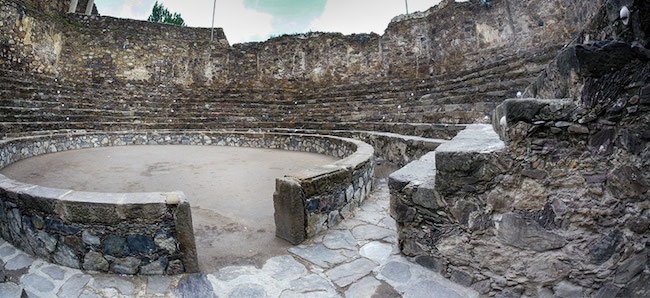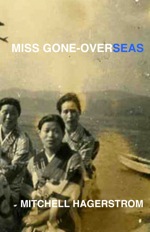
Gabriel lies sprawled back on the matrimonial bed, his head cushioned by a mountain of white-cased pillows piled against the headboard, his suitcase open at the foot, a bottle of Chilean red open on the bedside table, and a glass in hand. He takes careful sips as he watches his sister-in-law move about the room.
Taking a suit from the closet, Carolina puts it to her nose and sniffs. She detects a definite odor of cigarettes, yet she knows Gabriel doesn’t smoke. She wonders if maybe he sneaks around and smokes when he goes off on trips.
“No suits,” he says when he sees what she’s holding. He tells her he’s thinking of wearing jeans and a leather jacket, something to show he can’t be pushed around, something that can handle a little blood when he punches somebody in the nose.
Carolina laughs, she knows he’s making a joke, that he’s only going for business meetings and won’t be punching anyone. “Take the suit,” she says, “you can wear jeans on the plane.”
He makes his mouth small and narrows his eyes, as if he’s considering, but it’s all part of the game. He teases her and she loves the attention.
Draping the suit over the back of a chair, she goes to the dresser. From a drawer she takes two starched and folded shirts. After placing them in the suitcase, she tells him she thinks he might need a sweater, reminds him the evenings can be cool.
The bedroom door opens and two small faces peer around the corner: Marco and Marie Claire, bathed and ready for bed. When they see the suitcase, they look wide-eyed from Carolina to their father.
“The owl,” Carolina says to them. “Remember?”
“Oh! The owl,” they shout, stampeding into the room. Then hooting and hopping, they prance up and across the bed and over Gabriel’s legs, while the suitcase bounces merrily at the end of the bed. Gabriel holds high his glass of wine so it doesn’t spill all over his wife’s pristine counterpane.
“Carlotta!” he yells for the housekeeper. “Come get these kids!”
Carlotta has already changed from her uniform to a pink bathrobe. “Gracias, gracias,” Gabriel says to her, and he takes good-night kisses from the children. “Now, your auntie,” he reminds them, and they give Carolina kisses, too.
Before they leave, Gabriel wags his finger and tells them: “The red-eye, not the owl.”
They turn to him. “Huh?”
“In English,” he says, “It’s not the owl, it’s the red-eye.”
The red-eye, Carolina silently tells herself. But she knows that whatever the name, English or Spanish, it’s the late night flight that will take Gabriel from Houston to Mexico City, to his important meetings to which he will wear the suit she has chosen for him.
Now Helene is in the doorway. “What’s going on,” she demands. To her sister she says, “why are you doing this?” She crosses the room, removes her earrings and drops them into a china dish on the dresser, then turns to her husband. “You need to do your own packing,” she tells him as she kicks off her shoes.
“I don’t mind,” Carolina says. “It’s fun to help.”
“Fun,” Gabriel repeats. “We’re having fun.”
“You’re incorrigible,” Helene says to him.
“Incorrigible,” he mimics, then turns to his sister-in-law. “Am I, Caro?”
Carolina shrugs and says nothing. She doesn’t know what the word means.
Helene goes into the adjoining bath, but before shutting the door she says to Gabriel, “You remind me of that Garcia-Marquez story.”
He groans and holds up a hand, like a traffic cop telling her to stop. “Don’t give me Marquez,” he says.
She tells him anyway: “You’re exactly like that drunk traveling salesman in that story. He’s so drunk he’s dancing with two women at the same time. Yes, sooooo drunk and sooooo happy. He could not be any happier if besides his arms and his legs, he also had a tail.”
Helene goes into the bathroom and shuts the door.
“A tail?” Gabriel shouts, then turning to Carolina he rolls his eyes. “Now my ties, Caro. We know how important it is to select the correct ties.”
Carolina laughs. Choosing ties is her favorite part of helping him pack. Already she is missing him. After he’s gone there will be only Helene constantly telling her about her messy hair, that she dresses like a peasant and walks like a clodhopper — whatever that is. Over and over Helene tells her, “a little make-up wouldn’t hurt.
Don’t you want to look better?”
To that, Carolina always answers: “The way I look is fine with me.”
***** ***** *****
There are also red-eye buses, or the owl, as Carolina still prefers. The next day she packs a small valise, then takes her time to carefully compose and write a note saying she is going home to mama’s in Potosi. That evening, when the household — Helene, the children, Carlotta — have gone to bed, Carolina puts the note in the kitchen where Carlotta will find it in the morning, and calls a taxi. At the bus station she buys a ticket from Houston to Potosi.
Late morning the bus stops at a small town and everyone gets out to stretch, and maybe get a quick bite of something. Across the square Carolina notices a small bus bound for the nearby mountain village. It’s idling, waiting for more passengers. Quickly she buys a ticket and runs toward it. The driver sees her and holds the door.
The bus chugs out of town. Her fellow passengers are three men who seem to be sleeping off hangovers and a woman with a bundle of serapes and embroidered blouses. The road climbs up a winding, narrow road paved with ancient stone. Carolina sits on the mountain side of the bus, to avoid looking down on that sheer drop of hundreds of feet to the valley floor.
The driver stops at an ancient tunnel that passes through the mountain. When he cuts the motor, Carolina moves to the other side of the bus where she can watch for the man with the walkie-talkie at the entrance. The tunnel is only wide enough for one-way traffic, so the bus waits. A Volkswagen so old it no longer has a color pulls up behind the bus, and behind that a Coca-Cola truck. The sleeping men still sleep, the woman with her wares says nothing, and the driver sits with his back to them all.
Finally the man with the walkie-talkie signals and the bus driver starts the engine. Two vehicles emerge from the tunnel: a smart-looking silver car and a battered white van.
The tunnel is two kilometers long, the only illumination a single overhead bulb at the halfway mark. So for one long kilometer and then another there is only the weight of the mountain pressing down in the darkness.
Carolina feels her arms become too heavy to lift and the air seems scanty. She tries to empty her mind of fear. She takes small breaths and practices dying.
When the bus emerges from the tunnel, the daylight is dazzling. It stops in a wide empty area and, with the others, Carolina staggers off. She feels as unsteady on her feet as the men with hangovers. She follows on foot the slow-moving Coca-Cola truck as it rumbles along, bottles knocking against each other, into the village.
At the stalls lining the market street she sees few customers. The airs smells deliciously of roasted goat. She turns into one of the steep narrow side streets where she passes a cafe and sees, sitting at one of the outside tables, a young foreign couple with long tanned legs and hiking boots. Then, in the small plaza, she sees a woman wearing a sky-blue apron raking the flower beds.
The whitewashed hotel on the far edge of the village seems the same, although Carolina notices the balustrades along the upper walkways are now painted a gaudy red and adorned with Cafe Bustelo cans blooming with red geraniums. As before, the hotel is a work in progress with spikes of rebar jutting from the roof. A statue of St Francis stands in the upper garden. When she looks down into the lower garden, she sees the large concrete Buddha has now been painted that same gaudy red.
The proprietor remembers Carolina from the time before and asks for the health of her sister and the children.
‘Fine,” she tells him, “they are all fine.”
***** ***** *****
The time before: Helene had driven down with the children from Houston to Potosi to visit mama. Carolina had been listening at the door when mama told Helene: “She is so stubborn. Please, see if you can do anything with her.”
Carolina had been happy to be leaving and going to live with Helene in Houston. She was tired of mama’s complaints that she spent too much time in the kitchen with the maids instead of working on finding herself a husband. Although Carolina had always been fond of both her own father and Helene’s Gabriel, she had never truly understood the benefit of having a husband.
The time before: on the long drive from Potosi to Houston Helene decided they would take what she said would be an amusing side trip, up to a small mountain village, a place she had read about in a guide book.
They settled into a hotel, then visited the two churches. The one near the hotel was a ruin with pigeons nesting on the inside ledge of a partially collapsed Moorish-style dome. The other church, in the central plaza, had a floor of wooden coffin tops that shifted and creaked, making spooky sounds with every step.
Sitting in the sun outside that church Carolina noticed an older man whose face was as waxy and pale as the statues inside. He was wearing a hat such as fishermen wear and he was reading from a small, leather-covered book. The hotel proprietor had told them to look for such a man as he had the keys to the palenque. Just ask, they were told, and he will show you.
The man with the fisherman’s hat reminded Carolina of the tall German who lived next door at mama’s who also had a very long, pale face. Every day when Carolina and the maids snuck out for a cigarette before lunch they would watch him from mama’s dining room balcony. He would yell to the boys who worked for him, demanding the keys. The keys, the keys, give me the keys, he shouted. His courtyard was full of fancy cars. How did the boys know which keys he meant?
Helene had not been interested in seeing the palenque. “It’s just some dusty arena,” she said, “they probably use it for cock fights.” Instead they went to an old building that had been divided into artisan stalls and Helene shopped for earrings. She bought a pair of small silver balls for Marie Claire and a pair of large silver hoops for herself. She scolded Carolina for refusing every pair she insisted were perfect for her.
Meanwhile the children had become cranky with hunger. Helene found a restaurant on a nearby side street. The menu posted in the window listed spaghetti, lasagna, and other Italian dishes. Although the sign said open, the door was locked. When Helene knocked and then rattled it, a sleepy sounding voice called down from a small balcony, a girl who said they were open.
“The door is locked,” Helene called back, her neck stretched long like a goose.
They waited and finally the door opened. Carolina could see that the girl’s cheek was marked by a crease in her siesta pillow. Behind, the dining room was dark. They followed the girl to the inner courtyard where there was light and where some steps led to a second floor gallery.
“We have lasagna,” the girl said.
“The children would prefer plain pasta with butter,” Helene answered.
The girl frowned and repeated that there was lasagna.
Meanwhile Marco scooted up the steps toward the second floor. Helene called him back and sent him to sit in the darkened dining room. “Surely,” she said to the girl, “plain pasta is not a problem, with cheese, a few sauted mushrooms?”
Then Marie Claire started up the steps. Helene grabbed her by the arm and marched her over to stand against the wall. Such a pitiful little figure, Carolina thought, with her forehead pressed to the dusty wall, her tiny shoulders shaking theatrically in silent sobs. Truth was, Carolina thought Marco and Marie Claire were charming only when then they were in distress. Otherwise, under her breath, she called them brats.
The girl then explained to Helene that the power was off. However, the lasagna had been left in the oven and might still be warm enough to serve.
“Nevermind,” Helene said, throwing her arms in the air.
They all returned to the hotel where they were told the power was off in the whole village. They sat on the terrace and drank warmish beer and ate cold tamales. After that they watched the children toss bottle caps in the fountain and terrorize Michael, the hotel dog. That was all. Early the next morning they left for Houston.
***** ***** *****
The hotel registration card asks for occupation. Officially, Carolina thinks, I am the Sister of the Family, or the Auntie, or the Daughter. Now, at last, she tells herself she is none of those. She writes Tourist.
When she asks where she might find the man with the keys to the palenque, she’s told to look for him in one plaza or the other. Then, although she protests, the proprietor insists on carrying her small valise up to the room. Pepe, the fellow who usually carries the bag, he explains, is occupied repairing the stonework around the fountain.
“Soon,” he says, “we will be very busy.”
“Soon,” Carolina asks?
“In October,” he says, “when the pilgrims come for the feast of St Francis. They come for the miracles.”
“Are there miracles,” she asks?
He shrugs. Laughs.
“Are there?”
“Who knows,” he says, unlocking the door to the same room they had before.
Nothing has changed. The same thread-bare bedspreads and rough blankets, the same flat pillows, and the door to the bathroom still just a plastic curtain. Carolina kicks off her shoes, rinses her feet in the shower. In the mottled mirror she decides she looks like her grandmother. When she glances out the small window, down to the vast desert disappearing into the horizon, she can see eternity.
***** ***** *****
In the far corner of the hotel dining room Carolina sees the young foreign couple she had seen earlier at the cafe in the village. They are too far away for her to hear what language they are speaking to each other. She envies their fine hiking boots. Stretching out one leg, she turns her foot like this and like that, and imagines a fine hiking-boot instead of her shoe, the one especially fitted with a lift for her short leg.
When the proprietor’s wife brings the plate — cabrito, beans, ensalada — Carolina changes chairs and sits with her back to the couple. To her left is a large window looking out over the desert and the distant mountain ranges. To her right, through smaller windows, she can see the hotel’s collection of bird cages hanging beneath the eaves. The occupants of the cages, mostly parakeets, are oddly silent. Carolina thinks they look sickly.
After eating, as it is only late afternoon, she decides to walk back into the village. But soon she begins to feel weak. Perhaps it’s the altitude, she thinks. She stops to rest on a low wall. Between the wall and the cliff’s steep drop sits a small house, and in the courtyard a vehicle that looks like a Jeep, or somesuch. The door to the house opens and out steps a young woman in a bathrobe of white toweling. Her hair is pale and fluffy. Like an angel, Carolina thinks. “Fuck you,” the young woman shouts back through the doorway.
Carolina stands and quickly walks toward the village.
The small plaza is empty. In the shade of the tall trees the air smells of damp earth and damask. The rose bushes surrounding the bandstand are huge old shrubs. Carolina wonders if they might be Castilian roses, maybe from cuttings brought over from Spain over two centuries ago. She hears only faint sounds drifting up from the market street below.
Carolina knows the man with the keys will be in one plaza or the other. She decides to wait for him, and finds a place to sit. She watches and knows he will be carrying that leather-covered book, which may be a missal or a bible. Although the hotel proprietor’s wife, when Carolina asked, assured her the man was not a priest.
As Carolina waits, she anticipates: soon he will sit down on the bench across from me. He will ask me if I would like to visit the palenque.
Not yet, she will answer. Could we just sit here for a while?
For as long as you wish.
Forever?
If you wish.
And while she waits the plaza fills with the ghosts of young men in stiff collars and young women in taffeta skirts, courting in an endless paseo. The sound of wind in the tall trees mimics the swish of the girls’ skirts, as around and around they whirl, while black-cad duenas look on.
And Carolina hears the sound of scissors. Snip, snip. The woman she saw earlier raking the beds is now deadheading the faded roses, collecting the scented petals in the pockets of her sky-blue apron.
“Dame los llaves!” the tall German man shouts everyday at eleven o’clock at mama’s house when Carolina and the maids sneak out for forbidden cigarettes. From the balcony they hear him demand the keys.
Everyone wants the keys. Here the old man in the fisherman’s hat has them and all Carolina has to do is wait. She knows that one day he will give her the keys, and then she will be the one who sits in one plaza or the other, and she will be the one who takes people to see the palenque.








